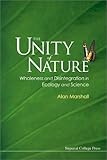The Unity of Nature Wholeness and Disintegration in Ecology and Science Alan Marshall
Material type: TextPublication details: London Imperial College Press 2002Description: 280 pages 24 cmISBN:
TextPublication details: London Imperial College Press 2002Description: 280 pages 24 cmISBN: - 1860943306
- 9781860943300
"The idea behind The Unity of Nature is a strong theoretical theme in a number of scientific and environmental fields from ecosystems ecology, through quantum physics to environmental philosophy and ecopolitics giving rise to an inspiring, optimistic, socially-responsive and environment-friendly worldview. The fields of science and environmentalism have inherited this theme of natural unity through an intellectual lineage that encompasses many non-scientific and non-environmental fields such as sociology, theology and political philosophy. Many of these fields have used natural unity in a way which is in stark opposition to the metaphysical and political desires of those who promulgate the unity of nature for progressive social change.This book discusses how this has transpired and examines the social and intellectual processes that have been at work. These include the social construction of the Organicism versus Mechanicism debate in ecology, the intellectual links between neo-classical economic principles and the 'New Sciences', the techno-scientific background of Gaia theory, and the social conservatism of ecological functionalism."
English
There are no comments on this title.
